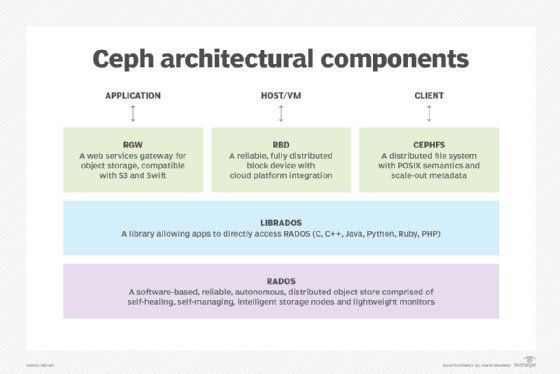Ceph
Ceph is open source software designed to provide highly scalable object-, block- and file-based storage under a unified system.
Ceph storage clusters are designed to run on commodity hardware, using an algorithm called CRUSH (Controlled Replication Under Scalable Hashing) to ensure data is evenly distributed across the cluster and that all cluster nodes can retrieve data quickly without any centralized bottlenecks.
Ceph object storage is accessible through Amazon Simple Storage Service (S3) and OpenStack Swift Representational State Transfer (REST)-based application programming interfaces (APIs), and a native API for integration with software applications.
Ceph block storage makes use of a Ceph Block Device, which is a virtual disk that can be attached to bare-metal Linux-based servers or virtual machines. The Ceph Reliable Autonomic Distributed Object Store (RADOS) provides block storage capabilities, such as snapshots and Replication. The Ceph RADOS Block Device is integrated to work as a back end with OpenStack Block Storage.
Ceph file storage makes use of the Portable Operating System Interface (POSIX)-compliant Ceph file system (CephFS) to store data in a Ceph Storage Cluster. CephFS uses the same clustered system as Ceph block storage and Ceph object storage.

History of Ceph
Sage Weil is credited with the creation of Ceph as part of a doctorate project at the University of California, Santa Cruz. The project was the culmination of years of research by professors and graduate students at UC Santa Cruz. The name Ceph stems from Cephalopod, a class of mollusks that includes cuttlefish, octopus and squid.
The Ceph open source project started in 2004, and the software became available under an open source license in 2006.
After completing his doctorate, Weil worked on the open source Ceph project with the support of DreamHost, a Los Angeles-based web hosting company he co-founded, and a small team of engineers. In 2012, they formed a startup called Inktank Inc. to provide a commercially supported version of Ceph for enterprise users.
Red Hat Inc. acquired Inktank in 2014 for $175 million. Weil assumed the role of Ceph principal architect at Red Hat.
Red Hat and SUSE LLC sell subscription-based, commercially supported versions of Ceph. Vendors offering hardware designed specifically for use with Ceph software include Fujitsu, Super Micro Computer and Western Digital's SanDisk division.
See also: block storage, object storage





